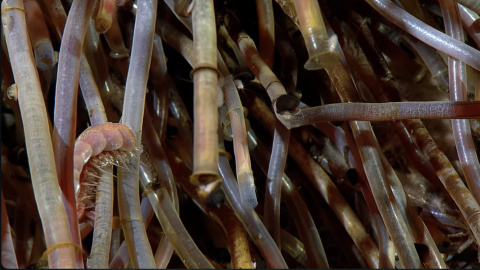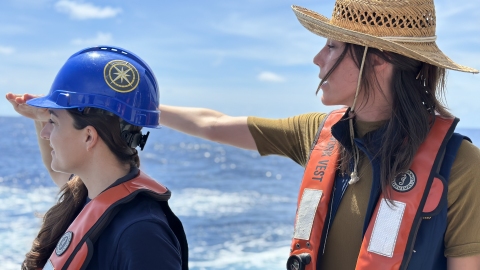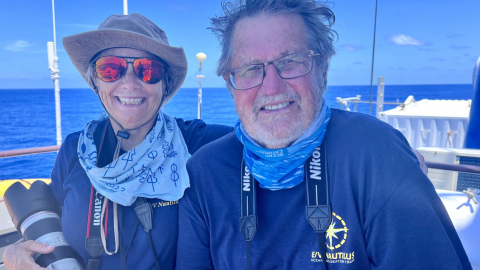Meet Ocean Explorer Heather Maran
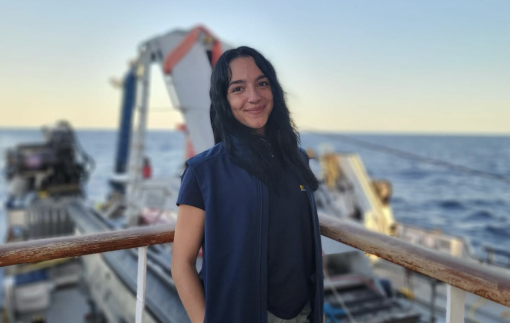
OET proudly welcomes Heather Maran to the Corps of Exploration as part of the Science & Engineering Internship Program. This internship program supports community college, undergraduate, and graduate students in building professional workforce experience and exploring STEAM-related careers that connect to research themes like robotics, ocean science, education, and exploration. Heather is joining E/V Nautilus for our NA166 expedition as a seafloor mapping intern.
We sat with her to learn more about her experience at sea and the path that led her to Nautilus.
Describe your role with OET.
I am one of 3 seafloor mapping and hydrography interns aboard the NA166 mapping expedition. My role consists of cleaning the multibeam echosounder data that is collected in real-time during transit and at our priority sites, mapping seamounts near Howland and Baker Islands. In addition, I have been practicing making data products using the multibeam backscatter to visualize locations on the seamounts that may be suitable for habitat.
Can you tell us a little about your background? What influenced you as a child?
I graduated last year from the University of Washington with a bachelor's degree in geology and oceanography, and have pursued a few things since then. I worked as a geologist for a geotechnical consulting company, and was a coastal monitoring intern at the Washington State Department of Ecology where my interest for studying nearshore environments grew. I grew up in a small coastal community in Florida where I spent a lot of time at the beach, and my father was a marine engineer and instilled in me a passion to study the ocean and to never stop asking questions.
When you were a kid, what did you want to be when you grew up?
To be honest, I did not have a good idea of what I wanted to be when I grew up, all I knew was that I wanted to study the natural world around me. I flipped between so many different passions, and still didn't know what I envisioned my career to be when I graduated college. I believe through experiencing many different fields of ocean science and geology I was able to piece together ideas of what I was interested in.
What would you consider to be your greatest challenge entering this field?
The greatest challenge I have experienced entering the field of oceanography is trying to find available opportunities to continue to build my skill sets. Most of the opportunities I have heard of were recommended to me by others in the field, so I found it can really depend on who you know to help you find what's available. Also, there are SO many different fields of ocean science to study, so trying to stick to one has been challenging since they are all so important and intersect in so many ways.
Do you have any advice for someone looking to follow a similar path?
I would recommend that you keep your options open, and don't hesitate to take an opportunity because it is outside of your comfort zone. To really find out what you want to pursue in life you need to experience many different things, don't stick with the first job you get out of school. Don't be afraid to fail, and most importantly ask questions and express your curiosity with those around you.
What's next for your ocean studies and career?
In the following year, my next big step is to attend a graduate program to study coastal geomorphology. My biggest passion is to study coastal erosion and work with local communities who are on the forefront of climate change to help with scientific guidance so they can implement future coastal resilience practices.
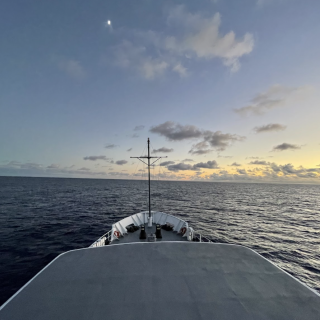
Seafloor Mapping Offshore Howland and Baker Islands
Howland and Baker Islands lie just north of the equator, about 1,800 miles southwest of Hawaiʻi. The islands are low-lying, sandy coral islands ringed by narrow fringing reefs and surrounded by the deep ocean. The US exclusive economic zone around Howland and Baker represents one of the least explored regions under US jurisdiction.
